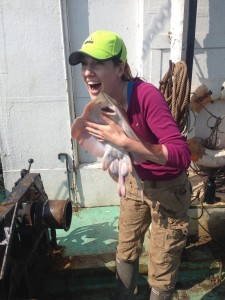 Julia Whidden completed her Masters in Biology with a focus on marine conservation from Acadia University in Nova Scotia, Canada, in 2015. Her project evaluated population demographics and species identification of two at-risk species of skate in the inner Bay of Fundy. She joins Dr. Neil Hammerschlag’s lab at the University of Miami for the year as a Fulbright Student and shark research intern. Follow her on twitter!
Julia Whidden completed her Masters in Biology with a focus on marine conservation from Acadia University in Nova Scotia, Canada, in 2015. Her project evaluated population demographics and species identification of two at-risk species of skate in the inner Bay of Fundy. She joins Dr. Neil Hammerschlag’s lab at the University of Miami for the year as a Fulbright Student and shark research intern. Follow her on twitter!
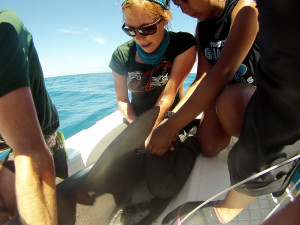 Rachel Skubel graduated with an M.Sc. in Environmental Science from McMaster University where she studied climate impacts on water cycling in temperate forests, and a B.Sc. from the University of Western Ontario. Her current research interests revolve around how oceanic predators will be impacted by anthropogenic environmental changes. She is a currently a shark research intern with Dr. Neil Hammerschlag’s lab at the University of Miami. Follow her on twitter!
Rachel Skubel graduated with an M.Sc. in Environmental Science from McMaster University where she studied climate impacts on water cycling in temperate forests, and a B.Sc. from the University of Western Ontario. Her current research interests revolve around how oceanic predators will be impacted by anthropogenic environmental changes. She is a currently a shark research intern with Dr. Neil Hammerschlag’s lab at the University of Miami. Follow her on twitter!
Up until this past year, the thought of Canadian politics had probably never crossed your mind. For some of you, your introduction to the topic may have been via the astute criticisms of John Oliver published this past weekend. His YouTube video currently skyrocketing at just under 3 million views in less than 48 hours, may have even been the introduction to Canadian politics for some Canadians. Let’s face it: in comparison to the flashy and sometimes trashy race of our neighbors to the south (ahem, you Americans), Canadian politics are usually tame, boring, and dry. In 2011, our last major election, 61.1% of Canadians voted (14.8 million), but up until the election last night, at least 68.5% have actively contributed to changing the dire political and environmental landscape formed by Prime Minister Stephen Harper and his Conservative cronies over the past 10 years. This voter turnout is the highest since 1993, and certainly demonstrates that – not unlike your defeat of Republicans following the Bush years – Canadians were ready for change.
To our newly elected Prime Minister Justin Trudeau, we say welcome and we’re ready for action.
You may be wondering, why is this election so important? Not only was Stephen Harper an ignorer of climate change and generally illogical when it came to any environmental protection, but also a cheat who admitted to committing election fraud in 2011. As scientists, we’ll focus here on the possibly irreparable damage that he’s caused to ecosystems, academia, and government science in the past few years. But first, a very brief breakdown of the parties at the table: the Conservatives (lead by Stephen Harper, PM from 2006 – yesterday, closely resembles a Lego man), the Liberals (lead by Justin Trudeau, newly elected PM, his father, the late Pierre Trudeau was one of Canada’s most beloved PM’s from 1968 – 1979, 1980 – 1984), the New Democratic Party (lead by Tom Mulcair), the Bloc Quebecois (lead by Gilles Duceppe, sometimes referred to as the radical French party), and the Green Party (lead by Elizabeth May, unsurprisingly pro-environment). So while the red vs. blue debate stands in a slightly different form in Canada, electing a less evil Prime Minister wasn’t so simple, due to these two notable differences between the Canadian and American electoral process: (1) there is no limit to the number of terms that a CDN Prime Minister can be in office – case in point that Stephen Harper was running for a fourth term, having already been in office for just under 10 years; (2) Canadians do not vote directly for their Prime Minister. Canadian provinces are divided into ridings, equivalent to counties, where citizens vote for a local representative. Whoever wins the most votes within a riding becomes the member of parliament, or MP, representing their party federally in the House of Commons. The leader of whichever party that has won the most ridings across the country becomes Canada’s Prime Minister.
As I’m sure most of you have Canadian colleagues with Facebook accounts and the like, you may already be familiar with the nationally embarrassing news of Canadian government scientists being muzzled. To recap, brave government scientists stepped forward to voice their concerns about the recent increase in bureaucracy restricting their research from being disseminated through media outlets. The media then became flooded with stories from the same vein – at the intersection of Canadian science and Harper, there is a collision. If government scientists weren’t going to be allowed to speak out about their research, controversial or not, then scientists from across the globe were going to speak out against this government – and controversy ensued. Here’s a short list of some of these stories, sprinkled with catastrophic bits about the destruction of scientific capacity in Canada:
(1) Department of Fisheries & Oceans (DFO) Canada Scientist Dr. Steve Campana
This past May, DFO government scientist Dr. Steve Campana underwent a bit of a life overhaul. After 32 years of working at the Bedford Institute of Oceanography in Nova Scotia, Canada, he quit his job before full retirement, spoke out about the muzzling of government scientists and moved to teach and conduct research at the University of Iceland. In the past 5 years, he claimed, unnecessary roadblocks were put up to prevent he and his colleagues from sharing positive, negative, and often non-controversial results from reaching the public. He was specifically instructed to ‘not make waves’, certainly frustrated by the 30 or so media interviews he was used to giving in decades past being reduced to only 3 per year. Dr. Campana was the head of the Canadian Shark Research Laboratory, and conducted well-known research in the field of fisheries research, specifically otolith aging. Not only did he cite muzzling as a major threat to scientific capacity in Canada, but also a decrease in resources available to government scientists, and a massive decline in reputation for Canadian science on the international scale (more on this later). In his interviews, he used phrases like “ideology vs. evidence, climate of fear, toxic work atmosphere, death spiral” to describe his disgust with Canadian government science. He genuinely does not believe that the scientific capacity of Canada can ever be restored following Stephen Harper’s government, no matter who replaces him in office. However, Justin Trudeau has committed to making massive changes in this area, and it seems like Canadian scientists are going to try to hold him to it.
(2) Purging of Department of Fisheries and Oceans Libraries
In January of 2014, it was announced that the Department of Fisheries and Oceans would be closing 7 of its 11 libraries across the country. They claimed that only 5 – 12 people visited the DFO libraries per year, but much of the purged materials were not available digitally and included long-term data that were never published. It’s saving the government $430,000 annually, and while proposed as a cost-cutting initiative suggested to ultimately benefit Canadian taxpayers, Dr. Wells of Dalhousie University’s International Ocean Institute sees it differently, “this situation [is] a national tragedy, done under the pretext of cost savings, which, when examined closely, will prove to be a false motive. A modern democratic society should value its information resources, not reduce, or worse, trash them.” Included in the trashed documents were data collected on the proposed Mackenzie valley pipeline, studied in the 1960s and 1970s. The ability to use this baseline data as a comparison for future development has now been lost – unless someone, somewhere, managed to adopt these abandoned documents from the pile they were left in.
(3) Leader of Marine Contaminants Unit, Dr. Peter Ross
In 2012, DFO announced that they had managed to reduce their budget by $79.3 million CAD. This, however, came at the cost of losing 400 employees and entire research programs (http://news.nationalpost.com/news/canada/killer-whale-expert-out-of-work-as-ottawa-cuts-ocean-pollution-monitoring-positions). One such example is Peter Ross and the Marine Contaminants Research Program in Victoria, BC. His team worked on economically and ecologically significant issues, including links between pesticides, salmon, and aboriginal community health, and accumulation of toxins (PCBs) in Killer whales. Peter was a leader in his field, and led research projects vital to the health of local wildlife and growing West Coast communities. In a 2013 interview about the program’s closure, Peter offered this opinion, “This government just doesn’t want to hear about science. They don’t want facts, they don’t want advice – they want to manage on the basis of their beliefs… With the legislative changes and the wholesale termination of a lot of programs, [Prime Minister Stephen] Harper has done damage that’s going to last decades.” This story has a happier status than some – two years after being shut down, his research has found a new home at the Vancouver Aquarium. Will the Liberal Party restore the Marine Contaminant Lab, along with others across the country? Time will tell.
(4) Scientists rebel against muzzling, and are supported by the international research community
Thankfully, the muzzling of government scientists could not be contained within Canada’s boundaries. Not only were restrictions put in place and resources cut, but this series of events has been discouraging for students hoping for a future in environmental and marine science in Canada. Further, researchers were concerned federal funding would be impacted, and their jobs possibly lost, if they voiced their concerns. With research collaborations and knowledge sharing, the current scientific climate is inherently international, and so concerns were raised about consequences for integrity and freedom of our nation’s researchers. In October of 2014, more than 800 foreign scientists signed onto ‘An Open Letter on Science to Canadian Prime Minister Stephen Harper’ emphasizing that “Canada’s leadership in basic research, environmental, health, and other public science is in jeopardy,” and urging the PM to “restore government science funding and the freedom and opportunities to communicate these findings internationally.”
(5) Environment Canada federal scientist and amateur folk singer Tony Turner.
Most recently, Environment Canada federal scientist Tony Turner was put on leave after releasing a protest song to YouTube called “Harperman.” The government investigated whether his casually-rhyming lyrics, unfulfilled melodies, and choir of barefooted backups qualified as a breach of the code of ethics and would impede his ability to objectively study migratory birds. Aside: It would be ironic if these birds were songbirds, but alas our poor attempt at a knee-slapper will die in vain. Concerning his leave, apparently Turner was planning on retiring this fall anyways. His video has garnered nearly a million views (don’t forget this is just under 1/30th of Canada’s population), and he sings out lines like “Who squashes all dissent/Who muzzles scientists”, with his choir singing the reply “Harperman, Harperman!” His video was tossed around on Facebook for a few months by academics and the public alike, and thankfully the Canadian people agreed with his message: “No respect for the environment, Harperman it’s time for you to go.”
Back to Politics
Now that Harper has left the building – or will do so in two weeks – it’s time to look forward to the promises that the Liberal party has built their platform on, and possibly won this election on. We present a few major issues related to marine science and conservation that Harper either dragged down or destroyed, and the complementary response by our new PM Trudeau from his platform. We can offer no current interpretation of potential improvement, but emphasize that since we can now use words like “potential” and “improvement” again – even in the same sentence! – things are looking up.
Research Funding – Shifting priorities
The National Research Council (NRC) is Canada’s equivalent of America’s National Science Foundation (NSF). In 2013, a reshaping of the NRC resulting in a 5% loss of funding overall, emphasis of funding priorities on industry-related research, and the elimination of the Major Resources Support (MRS) program. The latter had funded large equipment purchases for research external to Universities, facilitating past work on the much-maligned Atlantic Cod on the East Coast, and to long-term data collection at the Bamfield Marine Science Center, a stalwart of marine science on the West Coast.
This year has seen a funding landscape that focuses on industry-related projects and partnerships ; this is, of course, vital work, but is concerning if emphasized at the cost of basic science to inform policy and monitor our environment.
Based on the Liberals party’s platform, and their statements throughout the last year, here’s a taste of the contrasts between old and new:
| Harper/Conservatives | Trudeau/Liberals |
| Marine Protected Areas
Committed in 2011 to protect 10% of Canada’s coastal marine and coastal areas by 2020 under the International Convention on Biodiversity, but is lagging at a meager 1.3% – and only 0.11% is fully closed to “extractive activities.”
Proposed MPAs have been stalled by inaction, failure to cooperate by the federal government or stakeholders, and overall a system which needs an infusion of resources – not cuts – to meet ambitious goals. |
“We will increase the amount of Canada’s marine and coastal areas that are protected from 1.3 percent to 5 percent by 2017, and 10 percent by 2020.” Liberal Party’s Protecting our Oceans mandate |
| Freshwater Resources
Cut funding to protection and monitoring of freshwater resources and national parks – resources to enforce of marine protections that did exist were stretched. |
“We will also reverse the $40 million that Mr. Harper cut from the federal government’s ocean science and monitoring programs.” Liberal Party’s Protecting our Oceans mandate |
| Fisheries Act
Reworded the Navigable Waters section of the Fisheries Act to include protections for only 62 rivers, 97 lakes, and the 3 oceans Construction projects elsewhere no longer needed approval to pass through or develop in those waters (coincidentally accommodating for projects such as pipeline development). |
Will conduct “a wholesale review of Harper’s amendments to the Fisheries Act and other legislative changes, incorporating modern safeguards to protect our oceans and freshwater fish habitat.” – Liberal Party’s Protecting our Oceans mandate |
| Oil and Gas Regulations
“Under the current circumstances of the oil and gas sector, it would be crazy — it would be crazy economic policy — to do unilateral penalties on that sector” – Stephen Harper – Despite continued promises, non-transparent monitoring and regulation of emissions from oil and gas industries |
“We will explore, consult, and work collaboratively to move towards a system where federal environmental assessments of projects include an analysis of upstream impacts and the greenhouse gas emissions resulting from the projects being assessed.” – Liberal Party statement
|
| Carbon Tax
“Anybody who tells you that a carbon tax is an environmental policy is trying to pull the wool over your eyes” – Stephen Harper – Withdrew from the Kyoto Protocol, an international climate change agreement, seen by some as verifying Canada’s trajectory as an economy-first nation – Underwhelming performance on emissions reduction goals, and backtracking on past commitments for aligning commitments with the US |
-Will meet with provincial leaders to discuss a climate change strategy, such as a unified carbon-pricing scheme, as one of his first actions after forming government.
– Trudeau will personally attend the UNFCCC COP21 meeting in Paris next month to negotiate an international climate change strategy. |
In conclusion
As young Canadian scientists currently pursuing post-grad education in the US, we feel immense relief and restored pride in the election of Justin Trudeau. While Dr. Campana does not believe the loss of credibility and capacity in Canadian science can ever be restored, we are cautiously optimistic about Mr. Trudeau’s aforementioned platform and promises. As a first order of business, we suggest that Mr. Trudeau see to it that John Oliver becomes an honorary Canadian, for no other reason than he orchestrated an on-stage reunion between Mike Myers in a mountie costume riding a snow plow, a moose getting a colonoscopy, and a beaver playing Sweet Caroline on the keyboard. He also gets bonus points for bringing 3 million bits of attention to the fact that our new Prime Minister’s party trick is falling down stairs (your confusion is normal)
If you’re interested in any extra reading on this topic, and muzzling of science in particular, we recommend War on Science: Muzzled Scientists and Wilful Blindness in Stephen Harper’s Canada (2013) by Chris Turner.
For an exploration of where Marine Policy in Canada should go from here, look no further than Canada at a crossroad: The imperative for realigning ocean policy with ocean science from Meghan Bailey and colleagues:
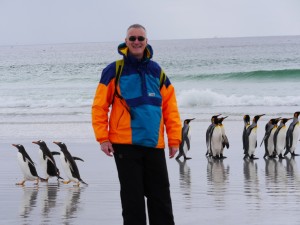
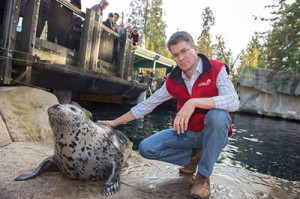

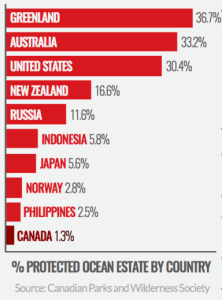
Thanks, Julia Whidden and Rachel Skubel, for an expert summary of some of the issues scientists and science have faced in Canada under the old Stephen Harper/Conservative party regime. To your comments on aquatic science, let me add that I know several scientist who have worked quite hard on getting terrestrial species at risk protected under Canada’s COSEWIC process, only to meet brick walls or incredibly slow movement on the part of the government. We will all have to keep these issues in front of the new government in hopes of improvement. – Clement Kent
Hi there. Thanks for citing our paper. Here is an updated link! http://www.sciencedirect.com/science/article/pii/S0308597X15002869
Megan Bailey